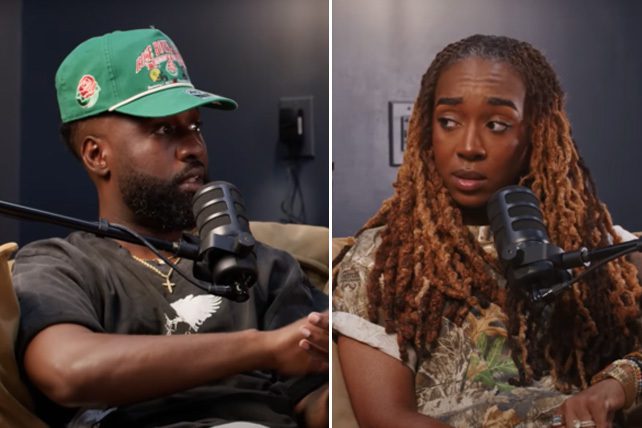Jackie Hill Perry believes that, when it comes to her style choices, God has given her the freedom not to fit within a culturally defined box of femininity. At the same time, she acknowledges that the Holy Spirit has at times challenged her in what she wears, particularly after she walked away from lesbianism years ago.
Jackie shared her thoughts in a broader conversation about biblical womanhood that she had with her husband, Preston Perry, in the latest episode of their podcast, “With the Perrys.” During the discussion, which was a follow-up to a previous episode on biblical manhood, titled “Act Like a Man,” Preston offered his perspective on how his wife has grown over time in her faith and as a godly woman.
Jackie Hill Perry and Preston Perry Discuss Honoring God With Our Attire
Jackie Hill Perry is a poet, author, hip-hop artist and Bible teacher. Her 2018 book, “Gay Girl, Good God: The Story of Who I Was, and Who God Has Always Been,” recounts her experience “coming out of the gay lifestyle and into a brand-new world of loving God His way.” In 2021, she published “Holier Than Thou: How God’s Holiness Helps Us Trust Him.”
Preston Perry is a poet, performance artist, teacher, and apologist. He is the author of “and he and Jackie have four children.
RELATED: Churchgoing Woman in Gay Marriage Asks for Jackie Hill Perry’s Thoughts
During their conversation, Preston described how he has seen Jackie settle into her femininity over time and how he has seen spiritual attacks against her because of her ministry. Topics the couple covered included submission in marriage, the value of having female perspectives in the local church, and how Jackie’s childhood experiences impacted her view of God, men, and herself.
Jackie said that when she first became a Christian, she consumed a lot of content on biblical womanhood in the form of books, podcasts, and sermons. However, she felt that much of this content was “not necessarily…biblically based but culturally based. And so it felt like they were using Scripture alongside a kind of evangelical white woman framework and applying that to everybody.”
Jackie gave as examples the idea that being a godly woman means mothers must stay at home, mothers must homeschool their children, or Christian women can’t be “direct or aggressive.”
“I’m not saying that every single book was like that,” she said, “but when I would read them all, it felt like, the way y’all are defining biblical womanhood looks like y’all—it doesn’t look like me.”
As a result, said Jackie, “I backed away from it because I had to. I wanted to wrestle with God and let him define me, and let the Scriptures define me.”
“And even let my life with you define me,” she told Preston, “let my life with my children, let my community define me, so that I wouldn’t try to live out a version of womanhood that was actually unnatural.”
To the question of how she would define “womanhood,” Jackie answered, “I would define it as simply that I am a woman made by God for his glory, with particular callings to steward, to be a wife, to be a mother, to be a friend, to be a communicator, to be a writer.”
“And all of these things are colored by my femininity,” she said. “All of these things are colored by my history as a woman. All of these things are colored by the way God communicates to me.”

